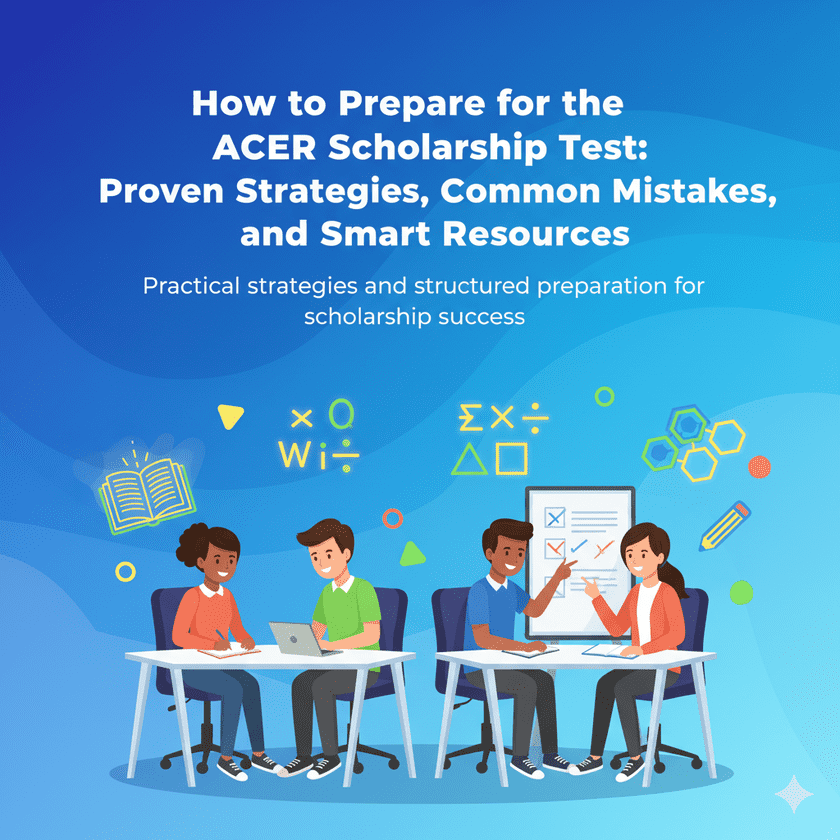The EduTest Scholarship Test is one of the most widely used scholarship and entrance assessments in Australia. Independent and private schools use it to help identify students with strong academic potential across multiple year levels, typically from Year 4 through Year 10. For many families, achieving a strong EduTest result can lead to opportunities for scholarships, selective entry, and advanced learning pathways.
EduTest assesses a broad range of skills, including reading comprehension, mathematical reasoning, written expression, and abstract thinking. It is designed to identify higher-ability students by presenting unfamiliar problems that require flexible thinking and sound reasoning skills.
Preparing for EduTest can seem daunting, particularly because the question styles and time pressure differ from those of standard classroom tests. However, families who understand the test's structure and prepare strategically can give their child the best chance to perform at their personal best.
Below are ten evidence-based “secrets” to help students prepare effectively, whether they are sitting the EduTest in primary or secondary school. This guide draws on official information from EduTest and preparation strategies from NotesEdu, a platform used by many families to familiarise students with EduTest question formats and improve specific skills over time.
1. Understand the Test Format and Content
The first step to effective preparation is understanding what the EduTest Scholarship Test involves.According to EduTest, the assessment typically consists of several subtests:
- Reading Comprehension — tests the ability to understand, interpret, and evaluate complex written texts.
- Mathematical Reasoning — assesses logical and quantitative reasoning, not rote memorisation of formulas.
- Written Expression — evaluates students’ ability to express ideas clearly and structure a response under time pressure.
- Abstract Reasoning — focuses on non-verbal problem-solving and pattern recognition.
Each subtest is timed, and the number of questions and difficulty level increase with the intended year level of entry. For example, students applying for Years 9–10 face longer reading passages and more complex mathematics questions than those applying forYear 5.
Familiarising yourself with the format is essential so students know what to expect on the day. Families often use official information bulletins, sample questions, and structured practice programs such as NotesEdu’s EduTest Platinum Course, which mirrors the currentEduTest structure for multiple year levels.
2. Develop Strong Study Habits and Time Management
Consistent, structured study over time builds familiarity and reduces stress. Students benefit from:
- Setting a regular study schedule, even short sessions, several times per week
- Breaking down preparation into focused skill areas such as reading, vocabulary, mathematics, and writing
- Tracking progress to see which areas improve and which need more work
Time management is crucial for EduTest because the test is designed to challenge students’ ability to work under pressure. Students who practise within time limits tend to pace themselves better on test day.
Platforms like NotesEdu offer timed practice modes and performance analytics, allowing students to practise efficiently and identify where they are spending too much time.
3. Build Strong Language and Vocabulary Foundations
EduTest places a heavy emphasis on reading comprehension and vocabulary. Students may encounter unfamiliar words that require careful interpretation. Expanding vocabulary steadily can make a significant difference.
The NotesEdu Language Vocabulary Course is designed to help students develop a strong foundation through structured wordlists, usage practice, and comprehension exercises. Combined with wide reading at home like novels, news articles, essays, vocabulary development helps students read more quickly and understand more complex texts.
4. Practise Reading Comprehension Regularly
Reading comprehension is one of the most significant components of EduTest. Passages are often longer and denser than those students typically see at school. Questions may involve inference, critical analysis, and identifying subtle textual clues.
Frequent, focused practice helps students improve both accuracy and speed. NotesEdu offers a dedicated Reading Comprehension Tests course that includes exam-style passages and questions, along with detailed explanations. Timed practice enables students to develop essential test-day skills such as skimming, scanning, and quickly identifying main ideas.
5. Review and Strengthen Core Mathematics and Abstract Reasoning Skills
EduTest mathematical reasoning tasks emphasise problem-solving, not memorisation.Students should review key number concepts, patterns, data interpretation, and logic puzzles. Abstract reasoning tasks often involve sequences of shapes and require identifying rules quickly.
NotesEdu’s EduTest Platinum programs for various year levels (including Year 9 and 10 Platinum)include extensive mathematical and abstract reasoning question banks, mirroring the complexity and timing of EduTest sections. Practising these regularly helps students recognise question types faster and avoid common traps.
6. Learn and Practise Test-Taking Strategies
EduTest rewards strategic test-taking. Some key techniques include:
- Reading questions carefully before answering
- Eliminating clearly incorrect answers to improve the odds when unsure
- Flagging difficult questions and returning to them later to maximise marks on easier ones first
- Using educated guesses when time is short, rather than leaving questions blank
Students can practise these strategies using realistic timed practice tests, such as those onNotesEdu’s platform. Applying strategies repeatedly under exam conditions helps students develop automatic habits that support performance under pressure.
7. Manage Stress and Test Anxiety Effectively
It’s normal for students to feel nervous before a scholarship exam. However, unmanaged anxiety can affect concentration and performance. Recognising signs of test stress early — such as negative self-talk, racing thoughts, or physical tension — allows families to put strategies in place.
Helpful techniques include:
- Breathing exercises and short breaks during study sessions
- Positive reinforcement and supportive conversations at home
- Encouraging balanced routines with sleep, exercise, and downtime
Building familiarity through regular mock testing (e.g., NotesEdu’s timed practice environment) can also reduce anxiety by making the real test feel more familiar.
8. Prepare for the Interview Stage
Many scholarship programs include an interview component after the EduTest. While the test assesses reasoning skills, the interview often explores motivation, interests, and broader achievements.
NotesEdu’s Interview Course offers structured guidance on common interview themes, communication skills, and mock interview practice.Preparing for this stage can help students present themselves confidently and articulate their strengths.
9. Use Feedback and Practice Reviews to Improve
Reviewing performance is one of the most powerful preparation tools. After each practice session, students should:
- Check incorrect answers and understand why they were wrong
- Look for patterns in mistakes (e.g., misreading, rushing, vocabulary gaps)
- Reattempt similar question types to reinforce learning
Platforms like NotesEdu provide detailed explanations and analytics, making it easier to pinpoint weaknesses and track progress over time. This helps students focus their efforts efficiently rather than repeating the same errors.
10. Start Early and Stay Consistent
EduTest measures skills developed over time, not crammed in a week. Starting preparation early, ideally months before the test, gives students time to gradually build vocabulary, reasoning skills, and test familiarity..Short, regular practice sessions are usually more effective than last-minute intensive cramming.
Many families use NotesEdu’sEduTest Platinum programs as part of a longer preparation plan, combining regular reading, vocabulary work, timed practice, and review. This structured approach helps students enter the exam with confidence and familiarity in the test environment.
Conclusion
The EduTest Scholarship Testis designed to identify high-ability students by assessing reasoning, comprehension, and problem-solving skills under pressure. While it is competitive, preparation that focuses on understanding the test, building core skills, and practising strategically can make a meaningful difference.
Families have a variety of preparation options. Some rely solely on self-study, while others use structured programs such as NotesEdu’s EduTest preparation courses, which mirror test formats and provide targeted skill development.
Disclaimer:
Preparation is not compulsory, and no preparation method can guarantee scholarship offers or specific test outcomes. Success depends on each student’s individual ability, effort, and performance on the day. NotesEdu is not affiliated with EduTest.
Starting early, maintaining balance, and utilising high-quality resources can help students approachEduTest with confidence, giving them the best chance to demonstrate their abilities.
















